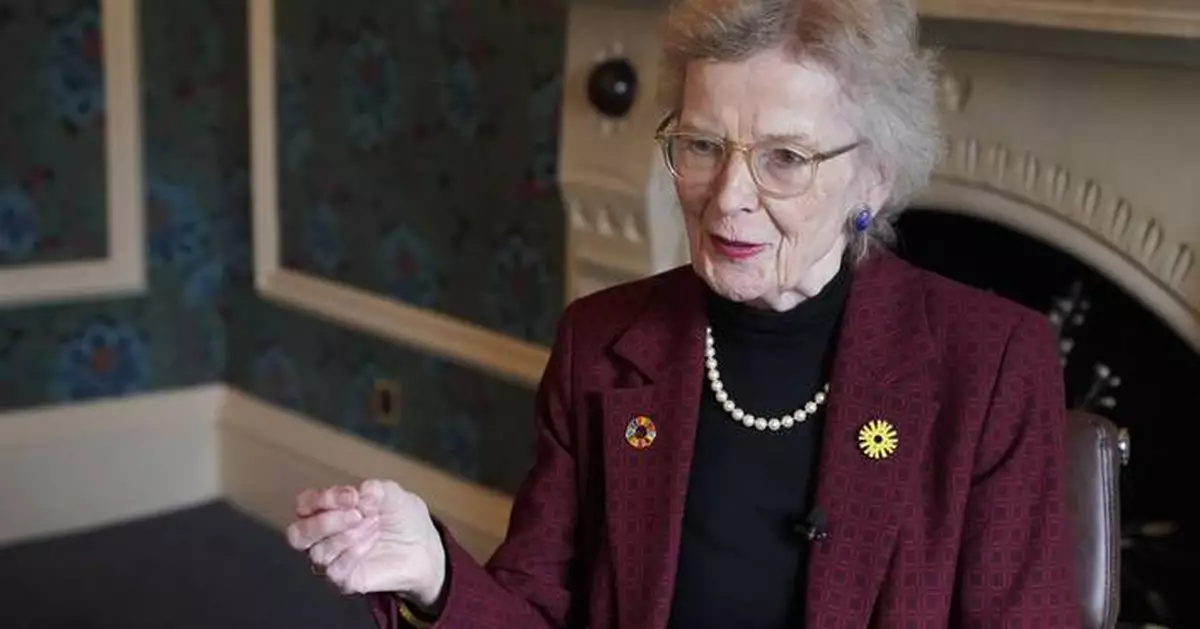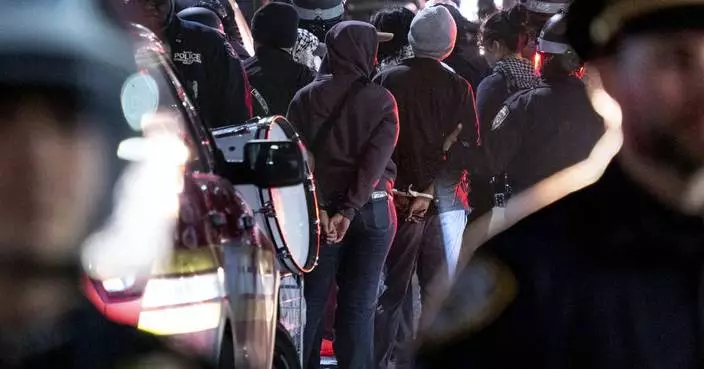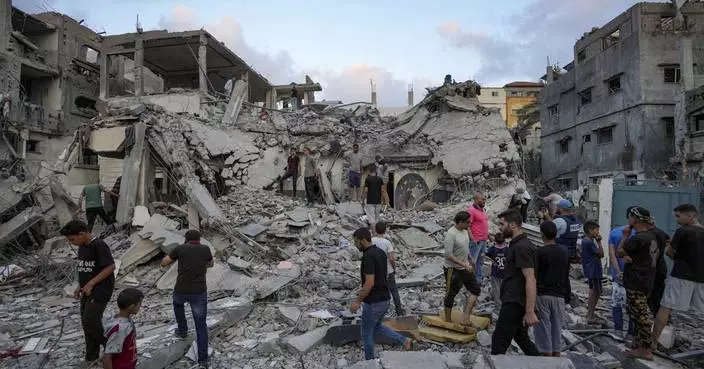OXFORD, England (AP) — Having a safe climate is becoming more of a human right globally with this week's European court decision that says countries must better protect people from climate change, something warming-hit residents of the Global South long knew, said former Ireland President Mary Robinson.
Robinson, who was the United Nations High Commissioner for Human Rights, praised Tuesday’s mixed court decision as precedent-setting and change-triggering. The European Court of Human Rights sided with Swiss senior women saying their government wasn't doing enough to protect them from climate shocks, but dismissed similar complaints from Portuguese youth and France's mayor on technical grounds.
“Many countries in Europe, if not all, will be vulnerable to litigation along those lines, that their countries are not doing enough to protect the human rights,'' Robinson said in a 30-minute interview with The Associated Press at the Skoll World Forum, a conference of ideas and entrepreneurship. "If countries do not protect their people, then they may be undermining the human rights. That’s completely climate justice."
“We established the European Court of Human Rights to protect us,” said Robinson, who was the U.N. human rights chief from 1997 to 2002. “I think this is an interpretation of a reality, which is that people are suffering from climate shocks. Governments are still not taking seriously enough their responsibilities.”
The decision brings the concept of a ensuring a safe climate to the richer, developed world, which has often been shielded from the worst climate consequences unlike the poorer south, Robinson, 79, said.
Robinson, now a top official in the group The Elders, which is retired leaders, used herself as an example of how oblivious to the problem the Global North could be. In seven years as president of Ireland, she said she never mentioned climate change. As the U.N. human rights chief she knew climate change was an important issue, but it was one that another agency was handling and not a rights issue.
It was only when Robinson started working for a non-profit she started to help in Africa that she realized that climate change was a rights issue, she said.
“The shocks weren’t nearly as bad in the richer parts of the world. That was the thing that really struck me,” when she worked in Africa. “I mean, women were saying to me, ‘Is God punishing us?’”
Brazilian Indigenous environmental activist Txai Surui said it's about time: “Our reality is so far from here, from the global north. People listen about the Amazon, listen about the Indigenous peoples, but they don’t really know what’s going on in your land. They don’t really know what it means when we say that we are fighting with our lives, with our bodies.”
“We know that this is a human right, because we are feeling it in our skin. We are feeling it in our body,” Surui said during a break at the Skoll World Forum. And it's frustrating, she said, when people don't notice it even though Surui and others are screaming for people to notice.
“When you people close your eyes to our reality, they condemn us and condemn yourselves,” because of the importance of solving climate change, Surui said. And Indigenous people feel it hardest around the world, she added.
Robinson also highlighted a basic injustice in climate change: “It affects much earlier, much more severely, the poorest countries, poorest communities, small island states, Indigenous peoples. Within that, there’s a huge gender injustice because of the different social roles of women at different access to power, lack of access to power.”
“Inequality is sapping the system,” Robinson said. “It’s eroding a sense of being humans together on this planet when you have this incredible wealth and power that goes with us — and so many people, feeling left out and and divided.”
But Robinson has hope because Brazil will host international economic and climate negotiations over the next two years.
“I have a lot of faith in Brazil in addressing this, I think there is a real intent to address inequality as well as sustainability and, you know, move forward,” Robinson said, mentioning the possibility of a global wealth tax. She also said world governments and banks “are spending $1.8 trillion a year on what is harming us, mainly fossil fuel subsidizing.”
Many young climate activists criticize the entire capitalistic system for warming's harms. Robinson sympathizes with them, pointing to social democracies in Ireland and Nordic nations as a better path.
“I think we do need a fairer system,” Robinson said. “What we have is a kind of rampant form of capitalism, which has been very extractive for a very long time, which has created these gaps of wealth, within countries and between countries. All of that is, you know, contrary to social stability.”
Add to that what Robinson called a form of “racist Christian nationalism” in the United States and parts of Europe that hurts weaker people and nations. She said it's fine to be proud of your country, but not to belittle, hurt or be scared of others.
When times get tough and your back is against the wall, Robinson said that's when it is time to embrace hope and "work with what you’ve got and you try to make the difference.”
Fabiano Maisonnave contributed to this report from Oxford.
Read more of AP’s climate coverage at http://www.apnews.com/climate-and-environment
Follow Seth Borenstein on X at @borenbears
The Associated Press’ climate and environmental coverage receives financial support from multiple private foundations. AP is solely responsible for all content. Find AP’s standards for working with philanthropies, a list of supporters and funded coverage areas at AP.org.
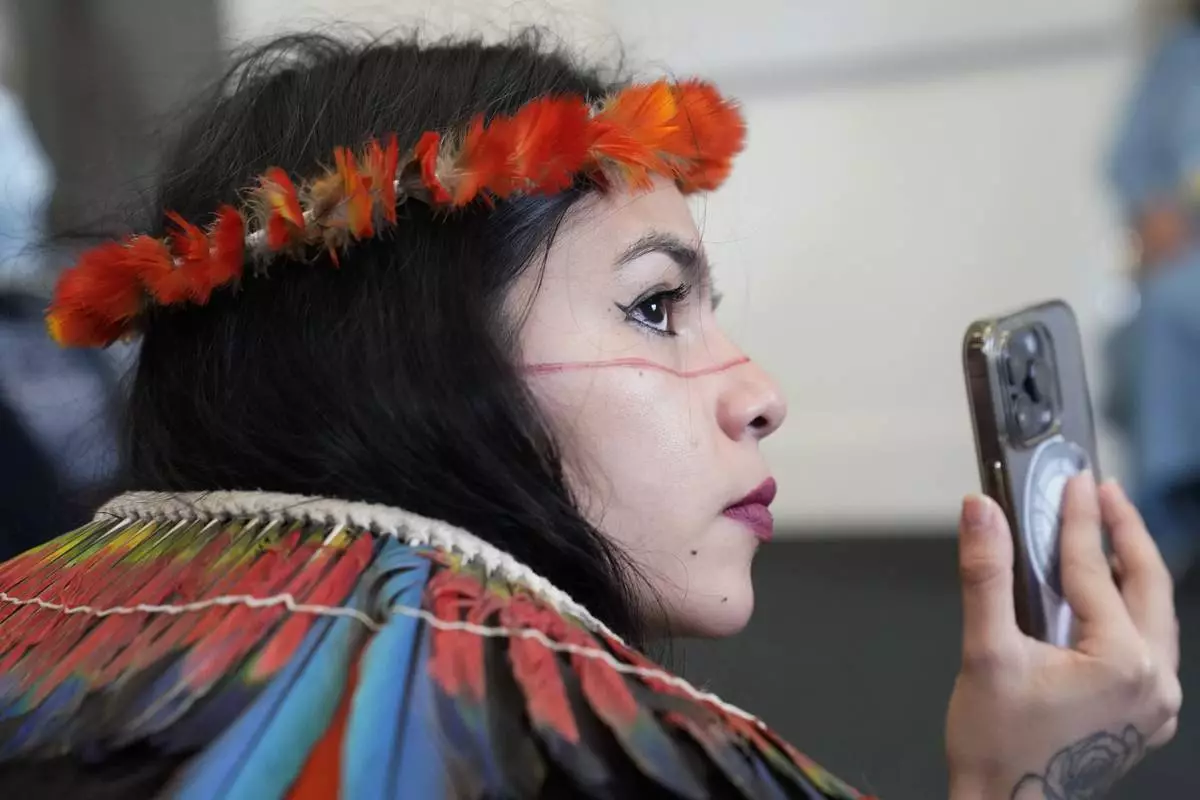
Txai Surui films a question from a journalist for Indigenous Peoples Minister Sonia Guajajara during the Skoll World Forum in Oxford, England, April 10, 2024. (AP Photo)

Former Ireland President Mary Robinson speaks during an interview with The Associated Press in Oxford, England, on Wednesday, April 10, 2024. (AP Photo)
TEL AVIV, Israel (AP) — U.S. Secretary of State Antony Blinken was meeting with Israeli leaders on Wednesday in his push for a cease-fire deal between Israel and Hamas, saying “the time is now” for an agreement that would free hostages and bring a pause in the nearly seven months of war in Gaza.
He has said Hamas would bear the blame for any failure to get a deal off the ground.
Blinken is on his seventh visit to the region since the war erupted in October in his bid to secure what’s been an elusive deal between Israel and Hamas that could avert an Israeli incursion into the southern Gaza city of Rafah, where hundreds of thousands of Palestinians are sheltering.
The current round of talks appears to be serious, but the sides remain far apart on one key issue — whether the war should end as part of an emerging deal.
“We are determined to get a cease-fire that brings the hostages home and to get it now, and the only reason that that wouldn’t be achieved is because of Hamas,” Blinken told Israel’s ceremonial President Isaac Herzog at a meeting in Tel Aviv.
“There is a proposal on the table, and as we’ve said, no delays, no excuses,” he said.
The deal would also allow much needed food, medicine and water to get into Gaza, Blinken said.
As part of his visit, Blinken will meet Israeli Prime Minister Benjamin Netanyahu. According to the State Department, he will also meet with the families of hostages and visit an Israeli port where aid for Gaza is entering.
Blinken’s comments came on the last leg of his regional visit, with previous stops in Saudi Arabia and Jordan, where he urged Hamas to accept the latest proposal, calling it “extraordinarily generous” on Israel’s part.
But the United States has also criticized Israel for its plan to invade Rafah, Gaza’s southernmost city where some 1.5 million Palestinians are sheltering from fighting elsewhere, saying that any major offensive there would bring potential harm to civilians and should be avoided.
Netanyahu has repeatedly vowed to invade Rafah, which he says is Hamas’ last stronghold, and on Tuesday’s pledged to do so “with or without” a cease-fire deal.
The current deal that is being discussed — with brokering by the U.S., Egypt and Qatar — would see the release of dozens of hostages in exchange for a six-week halt in fighting as part of an initial phase, according to an Egyptian official and Israeli media. Hundreds of Palestinian prisoners held by Israel would also be released, including some serving long sentences.
But a sticking point remains over what happens next. Hamas has demanded assurances that an eventual release of all hostages will bring a complete end to Israel’s nearly seven-month assault in Gaza and a withdrawal of its troops from the devastated territory.
Israel has offered only an extended pause, vowing to resume its offensive once the first phase of the deal is over. The issue has repeatedly obstructed efforts by the mediators during months of talks.
The Israel-Hamas war was sparked by the unprecedented Oct. 7 raid into southern Israel in which militants killed around 1,200 people, mostly civilians, and abducted around 250 hostages. Israel says the militants are still holding around 100 hostages and the remains of more than 30 others.
The war in Gaza has killed more than 34,000 Palestinians, according to local health officials. The war has driven around 80% of Gaza’s population of 2.3 million from their homes, caused vast destruction in several towns and cities and pushed northern Gaza to the brink of famine.
Follow AP’s coverage of the war at https://apnews.com/hub/israel-hamas-war
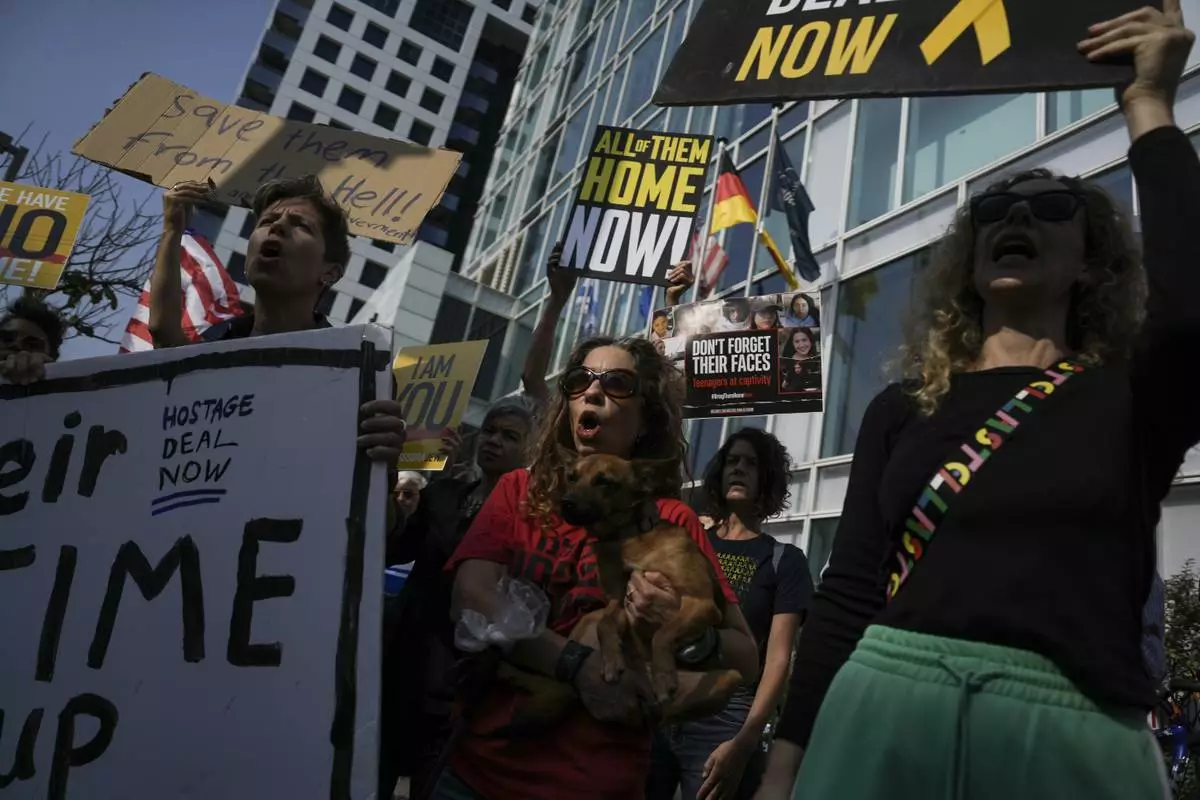
Families and supporters of Israeli hostages held by Hamas in Gaza hold banners and shut slogans during a protest calling for their return, outside a meeting between U.S. Secretary of State Antony Blinken and families of hostages in Tel Aviv, Wednesday, May 1, 2024. (AP Photo/Oded Balilty)
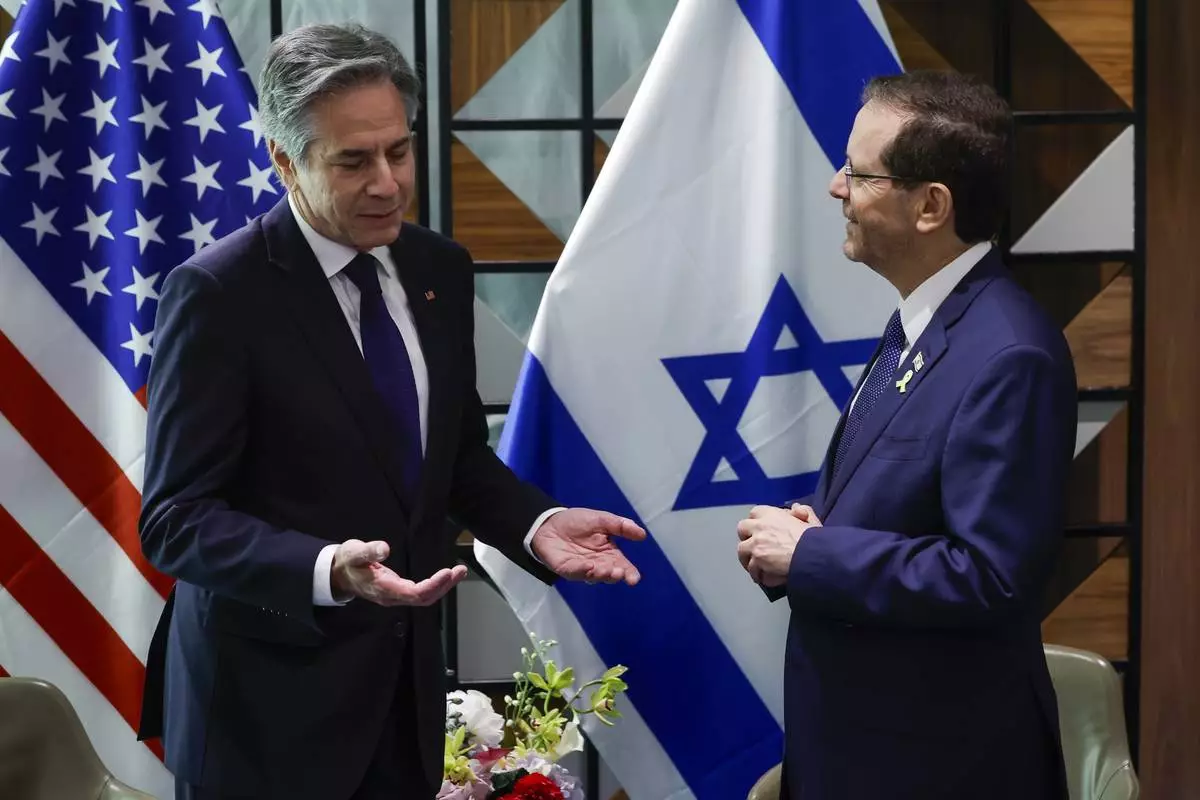
U.S. Secretary of State Antony Blinken, left, meets with Israeli President Isaac Herzog in Tel Aviv, Israel Wednesday, May 1, 2024. (Evelyn Hockstein/Pool Photo via AP)
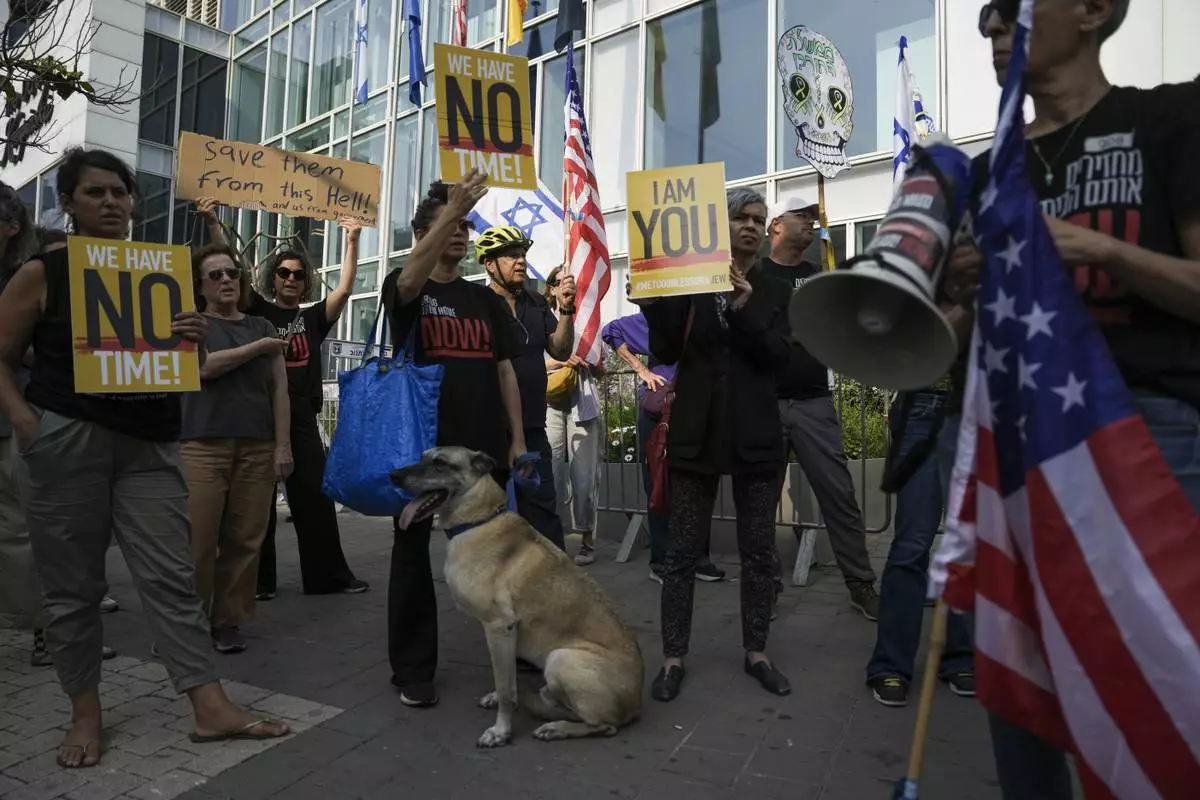
Families and supporters of Israeli hostages held by Hamas in Gaza hold banners and flags during a protest calling for their return, outside a meeting between U.S. Secretary of State Antony Blinken and families of hostages in Tel Aviv, Israel, Wednesday, May 1, 2024. (AP Photo/Oded Balilty)
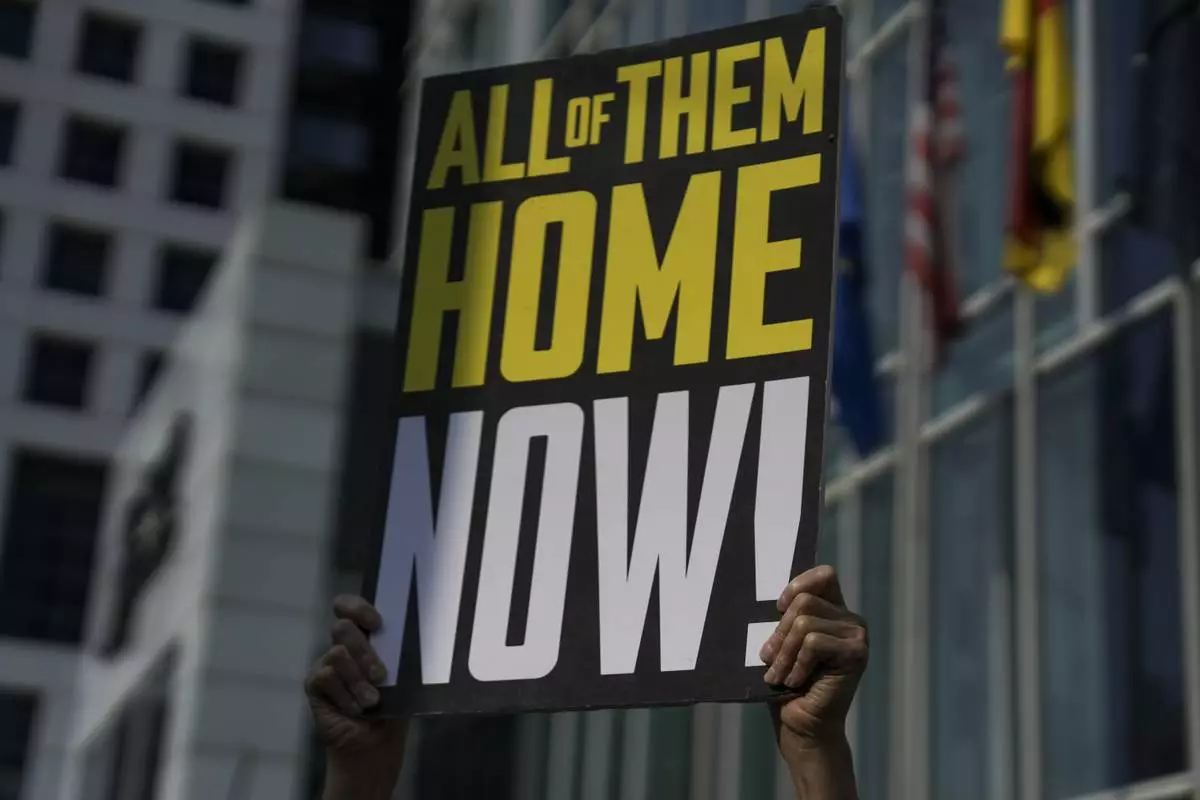
A woman holds a banner with families and supporters of Israeli hostages held by Hamas in Gaza during a protest calling for their return, outside a meeting between U.S. Secretary of State Antony Blinken and families of hostages in Tel Aviv, Israel, Wednesday, May 1, 2024. (AP Photo/Oded Balilty)
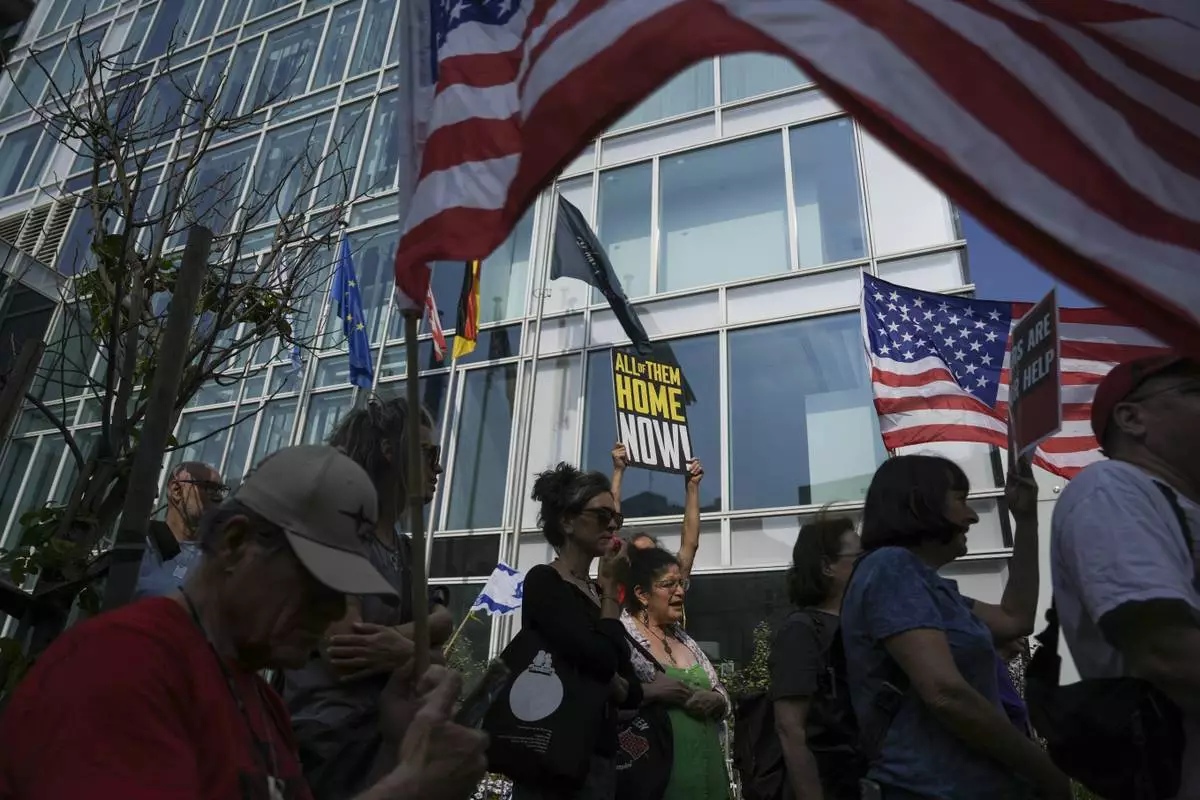
Families and supporters of Israeli hostages held by Hamas in Gaza hold banners and flags during a protest calling for their return, outside a meeting between U.S. Secretary of State Antony Blinken and families of hostages in Tel Aviv, Israel, Wednesday, May 1, 2024. (AP Photo/Oded Balilty)
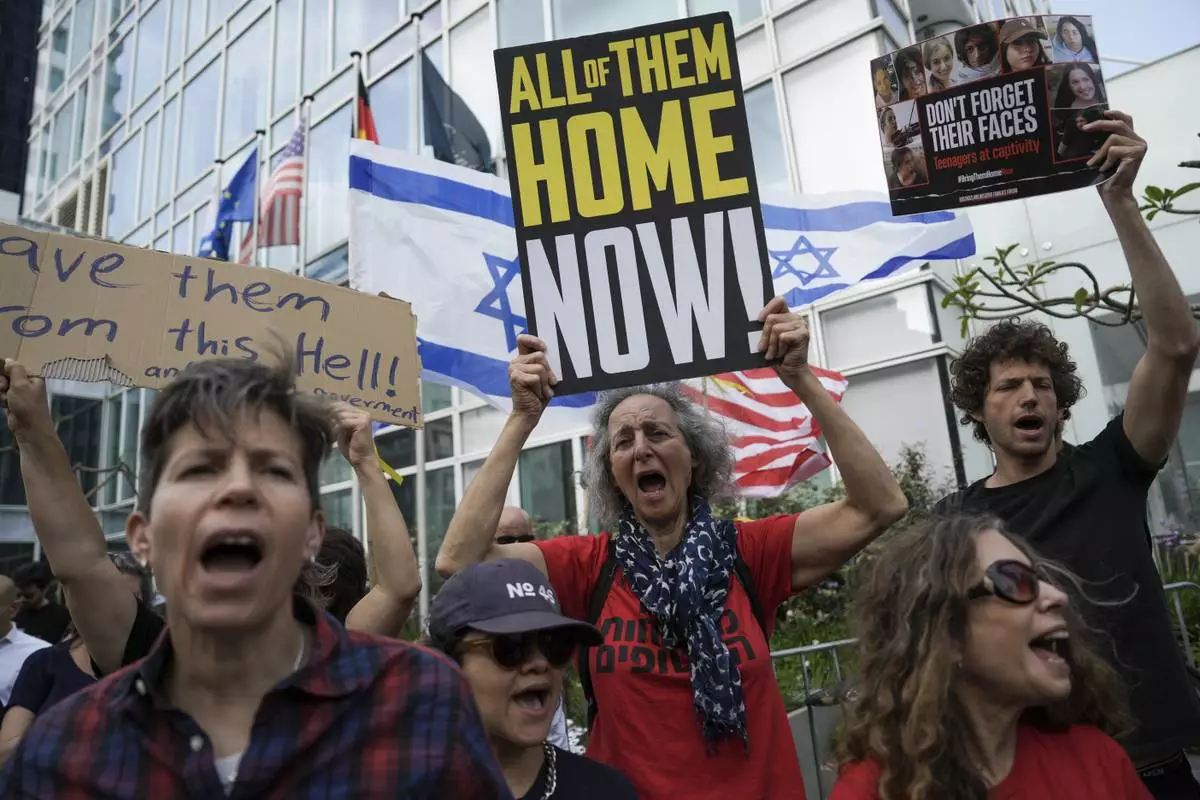
Families and supporters of Israeli hostages held by Hamas in Gaza hold banners and flags during a protest calling for their return, outside a meeting between U.S. Secretary of State Antony Blinken and families of hostages in Tel Aviv, Israel, Wednesday, May 1, 2024. (AP Photo/Oded Balilty)
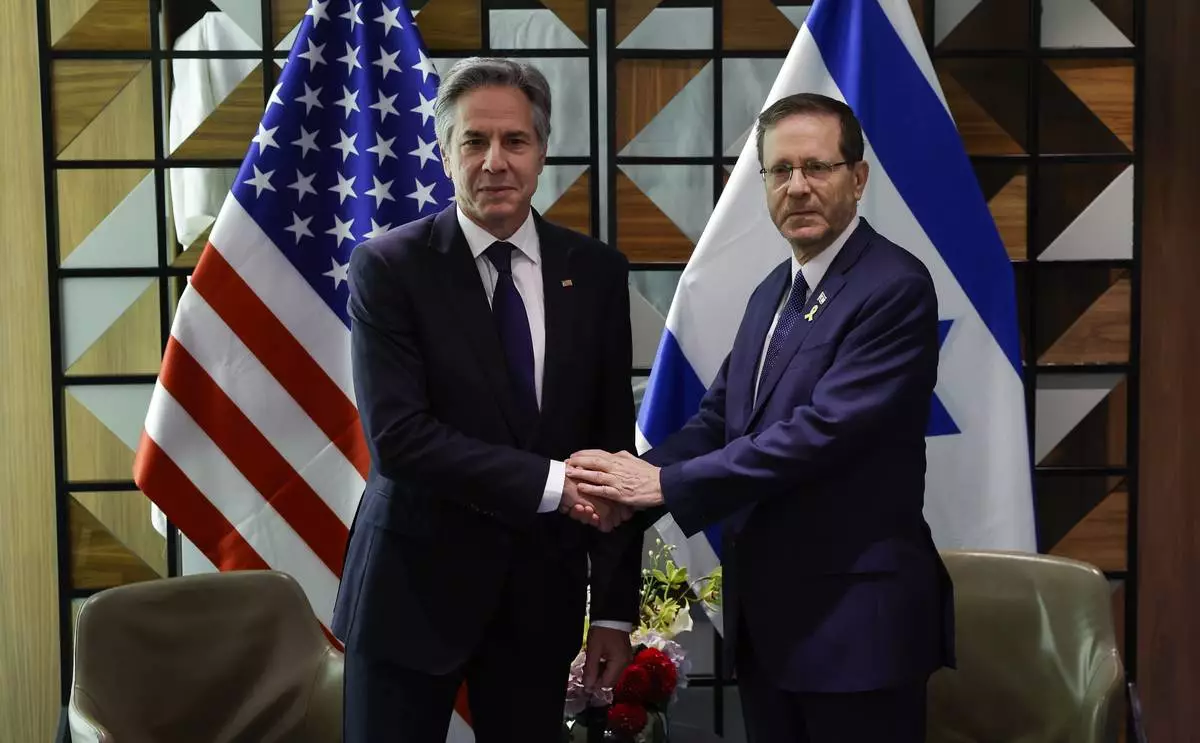
U.S. Secretary of State Antony Blinken, left, and Israeli President Isaac Herzog shake hands during their meeting in Tel Aviv, Israel Wednesday, May 1, 2024. (Evelyn Hockstein/Pool Photo via AP)
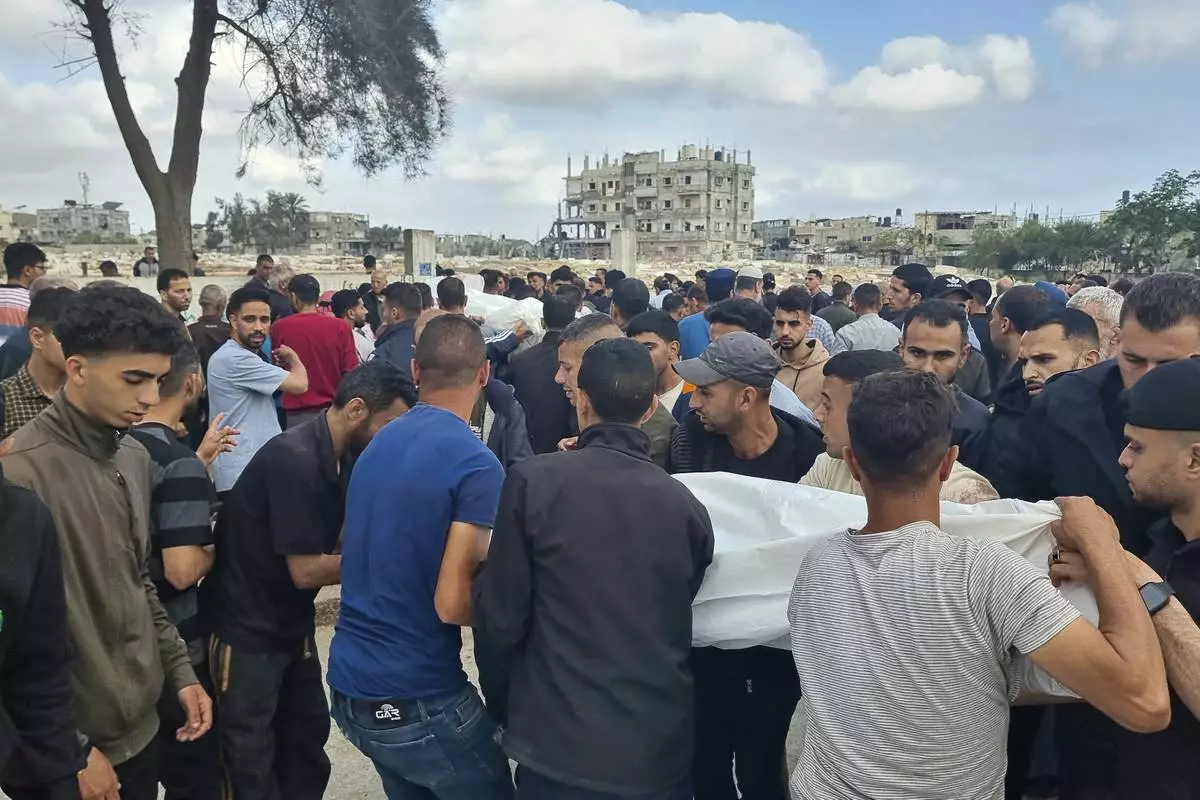
Mourners carry the bodies of members of the Abu Taha family who were killed in an Israeli airstrike, during their funeral at Al-Salam cemetery, east of Rafah, Gaza Strip. Monday, April 29, 2024. (AP Photo/Mohammad Jahjouh)
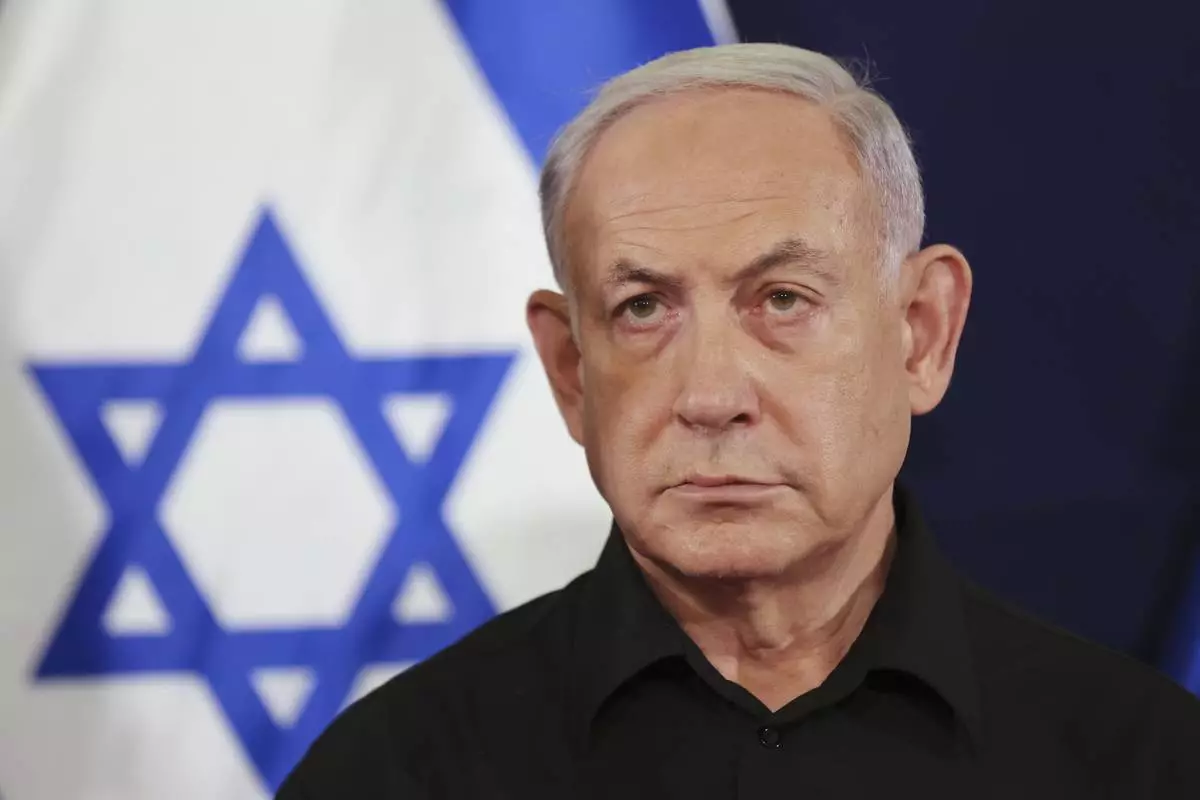
FILE - Israeli Prime Minister Benjamin Netanyahu attends a press conference in the Kirya military base in Tel Aviv, Israel on Oct. 28, 2023. Netanyahu pledged Tuesday, April 30 to launch an incursion into the southern Gaza city of Rafah, where hundreds of thousands of Palestinians are sheltering from the almost 7-month-long war, just as cease-fire negotiations between Israel and Hamas appear to be gaining steam. (Abir Sultan/Pool Photo via AP, File)
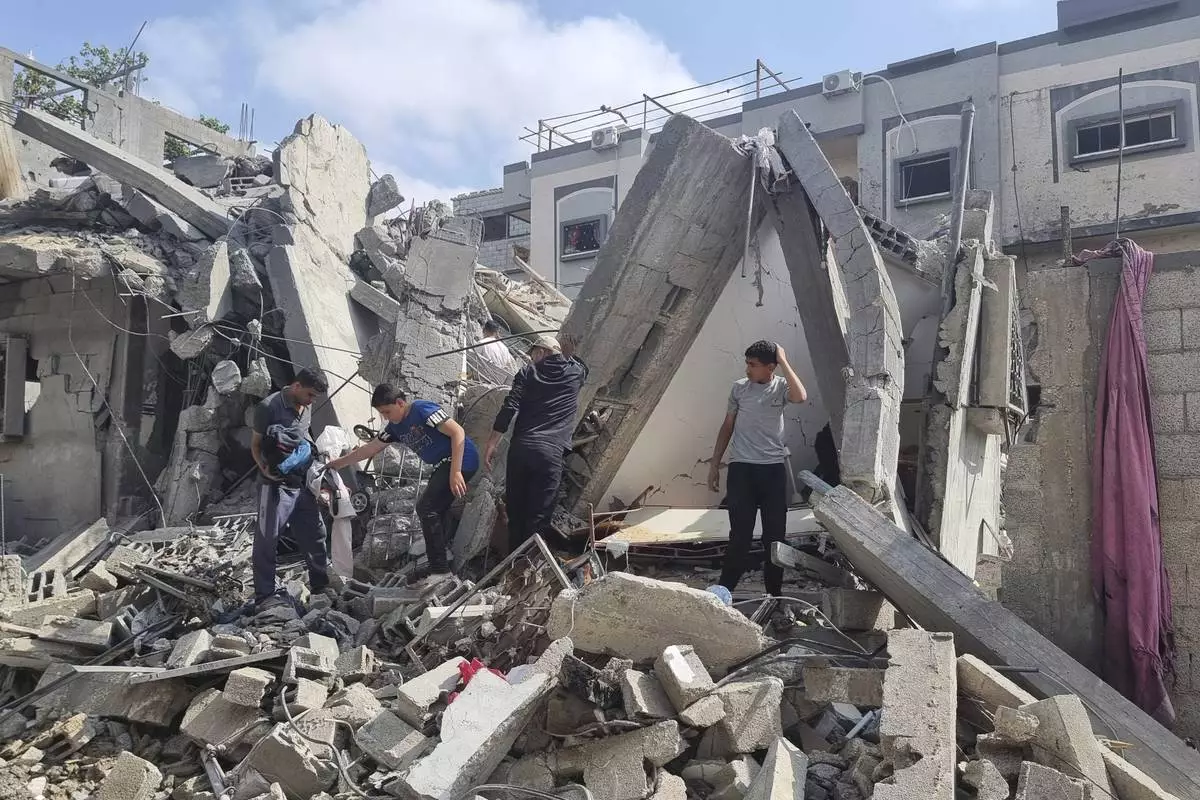
Palestinians look at the destruction after an Israeli airstrike in Rafah, Gaza Strip. Monday, April 29, 2024. (AP Photo/Mohammad Jahjouh)
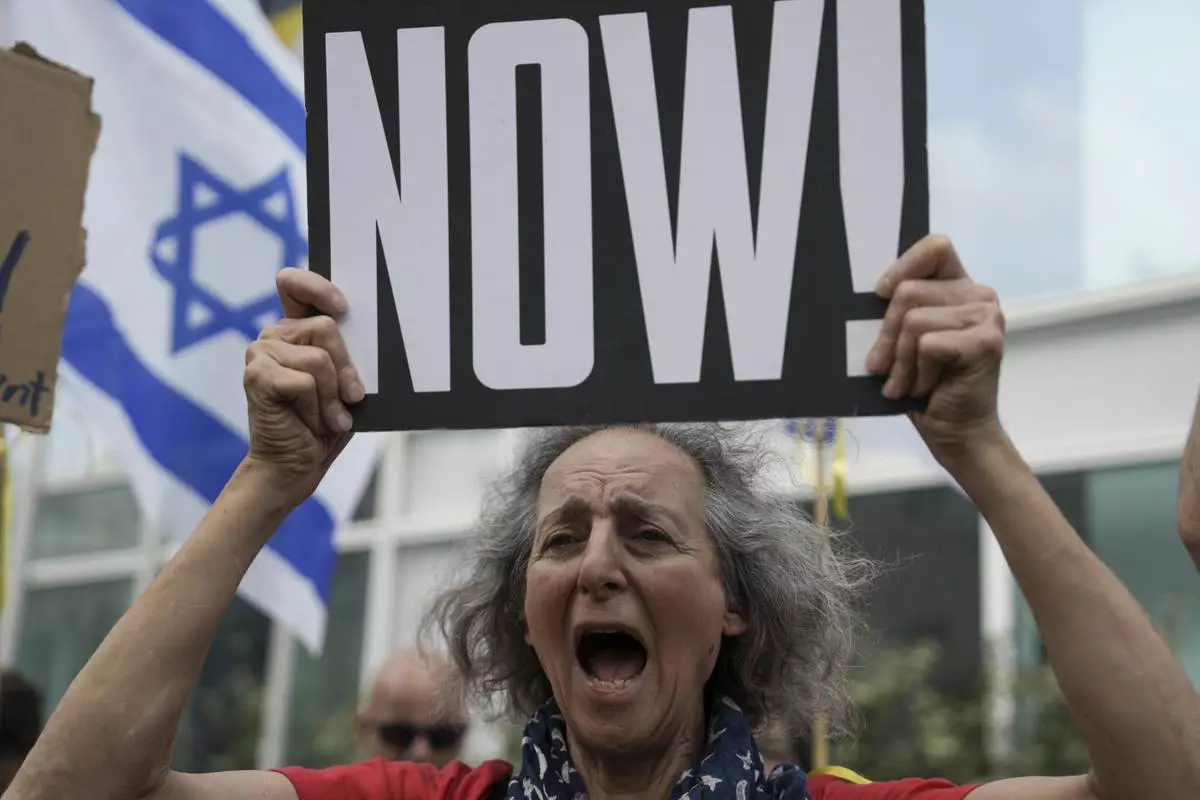
A woman holds a banner and shouts slogans with families and supporters of Israeli hostages held by Hamas in Gaza during a protest calling for their return, outside a meeting between U.S. Secretary of State Antony Blinken and families of hostages in Tel Aviv, Israel, Wednesday, May 1, 2024. (AP Photo/Oded Balilty)
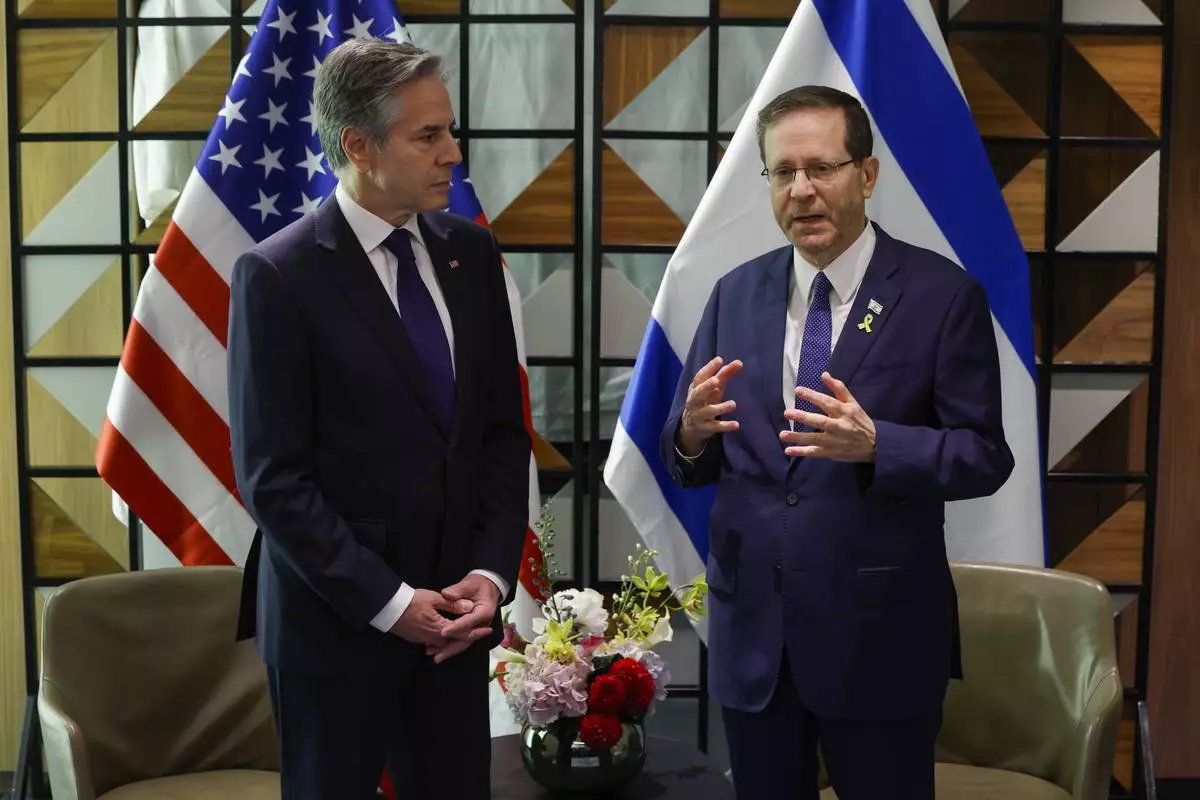
U.S. Secretary of State Antony Blinken, left, and Israeli President Isaac Herzog talk during their meeting in Tel Aviv, Israel, Wednesday, May 1, 2024. (Evelyn Hockstein/Pool Photo via AP)




